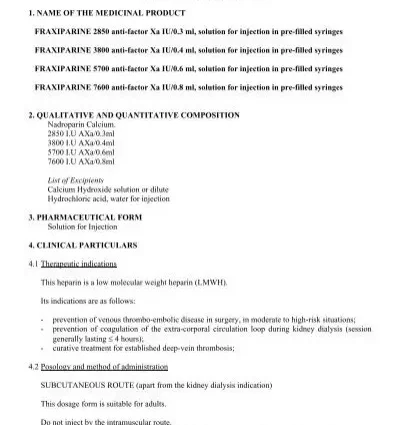Contents
In line with its mission, the Editorial Board of MedTvoiLokony makes every effort to provide reliable medical content supported by the latest scientific knowledge. The additional flag “Checked Content” indicates that the article has been reviewed by or written directly by a physician. This two-step verification: a medical journalist and a doctor allows us to provide the highest quality content in line with current medical knowledge.
Our commitment in this area has been appreciated, among others, by by the Association of Journalists for Health, which awarded the Editorial Board of MedTvoiLokony with the honorary title of the Great Educator.
Fraxiparine is a medicine used to stop blood clots from forming in blood vessels. Available in the form of injectable solutions, it comes in a variety of dosages. It is intended for adults.
Fraxiparine (Aspen Pharma)
1. FORM, DOSE, PACKAGE:
– solution for injection; 2850 IU AXa / 0,3 ml; 10 pre-filled syringes
– solution for injection; 3800 IU AXa / 0,4 ml; 10 pre-filled syringes
– solution for injection; 5700 IU AXa / 0,6 ml; 10 pre-filled syringes
– solution for injection; 7600 IU AXa / 0,8 ml; 10 pre-filled syringes
– solution for injection; 9500 IU AXa / 1 ml; 10 pre-filled syringes
2. AVAILABILITY CATEGORY: Rp. (prescription drug).
3. ACTIVE SUBSTANCE: nadroparyna.
Fraxiparine – action
Fraxiparine to an anticoagulant drugthe action of which is due to the presence of the active substance. Nadroparin has properties that inhibit the activity of factor Xa. It acts as an anticoagulant, delaying the production of thrombin and neutralizing the already produced thrombin. The thrombotic properties of Fraxiparine last for at least 18 hours.
Fraxiparine – purpose and dosage
Fraxiparine, available in the form of a solution for injection, is used in:
- surgery and orthopedic surgery to prevent the development of venous thromboembolism,
- to prevent deep vein thrombosis,
- the treatment of unstable angina and non-Q-wave myocardial infarction in combination with acetylsalicylic acid,
- in patients who are immobilized (for reasons other than surgery) to prevent venous thrombosis.
Dosage
Fraxiparine should be used according to the doctor’s instructions. The dose is selected individually – depending on the indication, patient weight and clinical condition.
Fraxiparine – contraindications to use
The anticoagulant drug Fraxiparine must not be used in the case of:
- hypersensitivity to any component of the drug,
- reduction in the number of blood cells in the past after administration of the preparation,
- bleeding or a disease that reduces blood clotting,
- a state of threatening bleeding
- have had a stroke due to bleeding in the brain
- acute infective endocarditis,
- severe kidney problems and are taking medication because of a blood clot or heart disease.
The drug should not be used in people under 18 years of age and in breast-feeding women.
Fraxiparine – warnings
Fraxiparine warnings:
- do not exceed the recommended doses,
- the drug should be administered intravenously or subcutaneously,
- if the drug is administered to a pregnant woman, consult a doctor,
- you should inform your doctor, among others about stomach ulcer and / or duodenal ulcer, severe liver disorders, eye diseases involving blood vessels,
- the drug should be discontinued immediately in the event of skin necrosis,
- the use of the drug may increase the amount of potassium in the blood,
- blood tests should be performed in patients over 65 years of age,
- do not stop the treatment without consulting your doctor,
- the needle cover may contain latex.
Fraxiparine – drug interactions
Fraxiparine may interact with other medications, so you should inform your doctor about all medications you are taking.
The use of Fraxiparine is not recommended when taking:
- acetylsalicylic acid,
- non-steroidal anti-inflammatory drugs (NSAIDs) such as ibuprofen
- antiplatelet drugs.
Caution should be exercised when Fraxiparine is used concomitantly with:
- oral anticoagulants
- right hand
- glucocorticoids.
Fraxiparine – side effects
Fraxiparine, like any other drug, may have some side effects.
Side effects such as: bleeding in various locations, small hematomas.
Often there are side effects such as: skin reaction at the injection site, increase in blood levels of enzymes produced by the liver.
It rarely happens: thrombocytopenia, thrombocytopenia, rashes, hives, calcifications under the skin.
Side effects such as: allergic reactions, increased eosinophilia, painful penile erection.
Before use, read the leaflet, which contains indications, contraindications, data on side effects and dosage as well as information on the use of the medicinal product, or consult your doctor or pharmacist, as each drug used improperly is a threat to your life or health.










